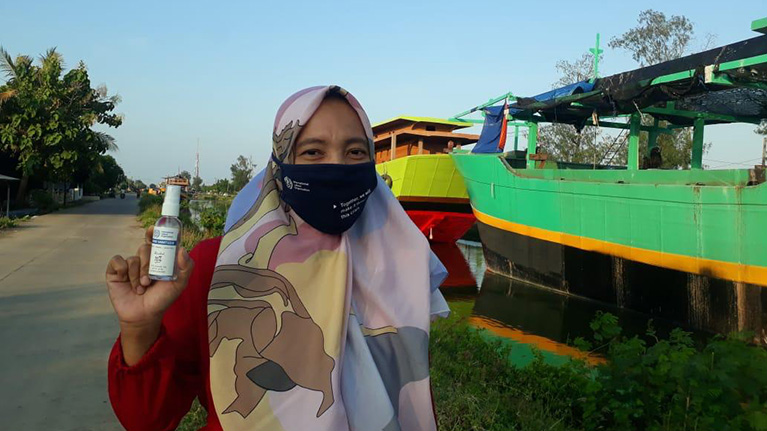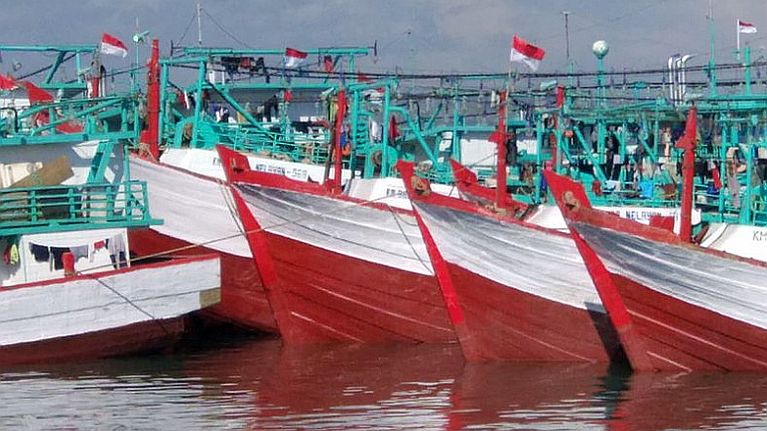Our impact, their voices
Knowledge helps Indonesian fishers survive the pandemic and prevent human trafficking
Fishing is one of the sectors impacted by the COVID-19 pandemic. Fishers do not only lose their livelihoods but also face a greater risk of human trafficking. The ILO and its partners raise their awareness for better protection and prevention.

“This is what I can do to preserve the catch that will be sold in my neighborhood. And if they don’t sale, these would be consumed by our family. At least we can save and do not waste the hard work of my husband,” she told.
Fishing is our lives and livelihoods."
Endang Wasrinah
Her family is a family of fishers living in the fishing community at Pabean Udik Village, Indramayu, West Java. Her husband has been a fisher since he was child; while Endang has spent her whole life sorting and processing the catch for sales.
“Fishing is our lives and livelihoods,” she added.
Since Indonesia reported its first confirmed COVID-19 infections in March, local governments have restricted travel between provinces and cities. Although food shipments are exempt from these restrictions, demand has gone down with the temporary closure of restaurants and shopping malls.
Fishermen from the north coast of Java, an area known as Pantura, have raised concerns about the impact to their industry and communities.
In Endang’s case, her family used to earn up to 2.5 million rupiah (US$150) per month and now their income has slashed by almost half. “We now only earn 1.5 million rupiah (US$90) or less. And we cannot even go fishing due to lack of gasolines,” she said.
Raising the awareness for better protection and prevention

I learnt more about the COVID-19 pandemic and how we can better protect ourselves and our families by washing our hands regularly, wearing a mask and maintain a physical distancing."
Endang Wasrinah
Endang's family is one of the thousands families reached out by this initiative. The ILO through its SEA Fisheries Project has collaborated with KPI, the Indonesia Fishermen Association (INFISA), Indonesia Fisheries Trade Unions (SPPI) and Indonesian Migrant Workers Union (SBMI) to distribute 4,000 masks and 4,000 hand sanitizers to fishing communities.
We want to strengthen the efforts that have been taken to curb the spread of COVID-19 epidemic while at the same time reducing the risks of fishers being trapped in human trafficking. The prohibition to go for fishing can increase the vulnerability of fishers to take exploitative employment without even knowing."
Abdul Hakim, the ILO’s project manager for SEA Fisheries Project
“We want to strengthen the efforts that have been taken to curb the spread of COVID-19 epidemic while at the same time reducing the risks of fishers being trapped in human trafficking. The prohibition to go for fishing can increase the vulnerability of fishers to take exploitative employment without even knowing,” stated Abdul Hakim, the ILO’s project manager for SEA Fisheries Project.
Meanwhile for Endang, she continues maintaining her hope and spreading the information and knowledge about how to prevent COVID-19 virus and human trafficking in her community. “We need to be hopeful during this difficult situation, but at the same time we need to be knowledgeable so that we can avoid risks of being fallen into exploitative jobs,” she said.
Funded by the United States Department of State, the ILO’s SEA Fisheries Project aims to reduce human trafficking in the fishing sector by strengthening coordination and increasing the efficiency and effectiveness of existing national and regional level anti-trafficking efforts in South East Asia.